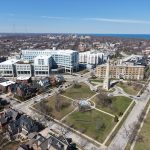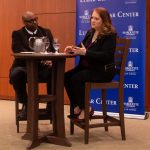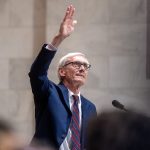Back From Madrid, Barnes Pushes Climate Policy
Lt. Governor attended international climate conference, envisions state as a climate policy leader.
Just back from a trans-Atlantic trip to advance the cause of progressive climate policy, Lt. Gov. Mandela Barnes is energized. The COP25 United Nations climate conference concluded in controversy, but Barnes came home full of optimism for policy change at the state level.
“People look to the U.S. for leadership. And to see us not be a leader in such a pressing time on such a pressing issue is very disappointing and disheartening,” Barnes told Wisconsin Examiner during an end-of-year interview in his office. As Wisconsinites headed into the warmest holiday season on record, reporters and officials from around the state were stopping into the lieutenant governor’s office to hear what he had to say about how how state policy could make a difference.
In an executive order, Gov. Tony Evers set a goal for Wisconsin to transition to 100% carbon-free electricity by 2050. The order also established an Office of Sustainability and Clean Energy, as well as mandating the creation of the state-level task force Barnes now chairs. The task force will provide policy recommendations for addressing climate-related issues in the state, from energy to infrastructure, by August 2020. It’s also a priority for the task force to address disparities in how environmental issues affect different demographic groups and communities.
The state task force on climate Barnes is leading held its first meeting in the Capitol recently, bringing together 30 members including representatives from the legislature, agriculture, public utilities, and tribes, among others. “We want to make sure that our work—our good work that’s going to come out of this task force—touches all communities equally,” Barnes said during the meeting. “Through this work, we may not get it perfect, but at least we can make it better.”
Lt. Gov. Barnes and 70 other U.S. elected leaders traveled to Madrid as part of the U.S. Climate Alliance. After President Donald Trump pulled out of the Paris Climate Accords, scores of state and city governments pledged to continue developing policies to reduce emissions and adapt to changing weather patterns.
Democracy Now reported that the U.S. essentially had no official presence at the international climate conference, but still obstructed progress in the talks. Protests and demonstrations surrounded the event, with grassroots organizations from around the globe calling for immediate climate action, and carbon reduction.
Noting an “official side and unofficial side” to COP25, Barnes explained that much of the work done there for state leaders was more on the unofficial side of things. “I like to explain it as the unofficial side being a counter-weight,” Barnes told Wisconsin Examiner, “like established political parties, there’s the grassroots groups, the advocacy groups, that push and sort of inform the work of the official and established party.”
Barnes said that, “regardless of the awful decision-making of the president to pull out of the Paris Climate Agreement formally, states have risen up to meet the challenge. The U.S. Climate Alliance, the states that are a part of it, represent over half the population of the United States and, collectively, would be the number 6 carbon emitter in the world.”
At COP25, Barnes saw many people who were “frustrated that the U.S. is not doing what we’re supposed to be doing, being the most wealthy and powerful nation. And I get it, that’s a legitimate valid concern. But I also want people to know that that’s not representative of us all.” He added that it’s imperative that, regardless of decisions from the federal government, state and local governments step up to the plate.
On Dec. 20, The Capital Times published a column written by Barnes, in which the Lt. Gov. wrote that “Wisconsin can lead the Midwest and provide a new model of climate leadership in America.” Over $11 billion in damages has been inflicted in the U.S. this year due to extreme weather, with Wisconsin experiencing dramatic cold snaps and worsening flooding. According to the Wisconsin Initiative on Climate Change Impacts, the Badger State will warm as much as 4 to 9 degrees Fahrenheit by 2050 if current trends continue.
“No matter how we evolve as a global society, by 2050, we can be planning for this. This is likely going to happen,” said Dan Vimont, WICCI’s co-director and director of the Nelson Institute Center for Climatic Research at the University of Wisconsin—Madison, during the task force meeting, WPR reports.
August Ball, task force member and founder of Milwaukee Cream City Conservation, urged the task force to be attentive to the needs of minority communities affected by climate change. Ball is also a member of the Milwaukee Climate and Equity Task Force.
Dylan Jennings, a member of the Bad River tribal council, shared his observations of how the environment is shifting. “We’re seeing in real time the recession of trees,” he said during the task force meeting. “We’re seeing the real-time sporadic seasons and how they’re affecting our subsistence lifestyles and the change in the migration of some of the animals and the spawning seasons.” Greta Neubauer (D- Racine), who introduced a package of “Forward On Climate” bills along with other state representatives, also has a seat on the task force.
That’s especially true after what Barnes has heard called “COP-out 25,” due to some of the largest countries not taking seriously their climate commitments. “That’s a very fair assessment,” said Barnes, “in terms of what came out of the official side, what came out of poor negotiating.”
Pushing climate policy, Barnes says, has been a high point of his time as Lt. Governor. Under Gov. Tony Evers’ administration, Wisconsin has become one of nine states committed to power itself with 100% renewable energy by the year 2050. “This is how we hope to bring opportunity to Wisconsin,” Barnes explained. “People are seeing this, people are paying attention. And I just want to draw that connection, too, that this is terrible. And we need to do everything we can as a global community to address this.”
Reprinted with permission of Wisconsin Examiner.
If you think stories like this are important, become a member of Urban Milwaukee and help support real, independent journalism. Plus you get some cool added benefits.






















